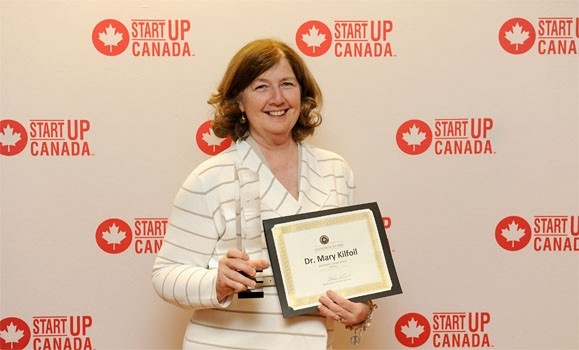The 10 companies enrolled in Dalhousie University’s LaunchPad accelerator pitched their businesses to an audience at the Rebecca Cohn Auditorium on Wednesday evening.
The pitching event marked the conclusion of LaunchPad, which is offered by Launch Dal, the group within Dal created to teach and support entrepreneurship. Each team in the cohort received $10,000 in funding for their business, as well as networking and mentorship opportunities.
“The Norman Newman Centre’s LaunchDal program is referred to as the flagship for innovation and entrepreneurship at Dalhousie,” said Director Mary Kilfoil during the event. “The LaunchPad accelerator is the apex of what we do.”
The event included a presentation from members of the entrepreneurial community thanking Kilfoil for her contributions to the local startup ecosystem.
Previous graduates of LaunchPad include automated construction flagging equipment-maker Site2020 and contact lens technology startup Coloursmith Labs.
Here’s a look at this year’s LaunchPad companies:
- Arolytics is developing a software platform to help oil and gas producers—and other greenhouse-gas-emitting companies—comply with tightening methane emissions regulations. The platform collates and synthesizes data from sensor equipment, automatically generating regulatory compliance reports and suggesting steps to reduce emissions. The company previously received funding from Volta Cohort.
- Smart Design Systems, formerly Smart Engineering, is developing a cloud-based software package that will allow engineers to analyze the safety of structures they design. Unlike existing software, Smart Design Systems uses computer graphics cards for its calculations, which will significantly improve speed and allow engineering firms to quickly assess possible options.
- Novaspectrum Analytics is creating SeaLogR, an online platform for business-to-business sales of individual lobsters, as opposed to by-the-pound sales. It aims to facilitate increased transparency about the quality and size of lobsters being sold.
- Cohability’s platform will allow users to find roommates and living arrangements based not only on budgets, but on personal compatibility, using dating website-style matching algorithms. The company will vet users’ profiles, and offer interventions to roommates who don’t get along.
- EcoPliance hopes to distribute reusable containers to food retailers on university campuses and other environments where single-use plastic and paper products are commonplace. Customers will be asked to discard the containers in designated bins for washing and reuse.
- Foodona is developing technology to recycle paper into durable papers bags as an alternative to unsustainable plastic bags and expensive, potentially inconvenient canvas bags.
- ViSUM Neurotechnologies is designing virtual reality software to perform cognitive assessments and rehabilitation for people with attention deficit disorders and similar conditions. The software will track users’ attention based on their eye movements and pupil dilation.
- Light Me Local is a website that helps businesses and freelancers find each other based on their locations, scheduling restrictions and the style of the freelancer’s work. Other freelancing platforms exist, but they tend to be global in scale and don’t easily facilitate projects that are constrained by geography.
- Big Talk Co. sells clothing with graphics designed to encourage conversation about “world issues that matter to you.” The clothes are made of recycled water-bottles, with the goal of creating a domestic market for the used plastics that can no longer readily be shipped to China.
- Valued Option is developing a radio-frequency technology—as well as software and analytics tools—that will allow companies to transmit sensor data over longer distances (up to 20 kilometers) than is possible using existing solutions. One key application is the testing process for automotive manufacturers.










